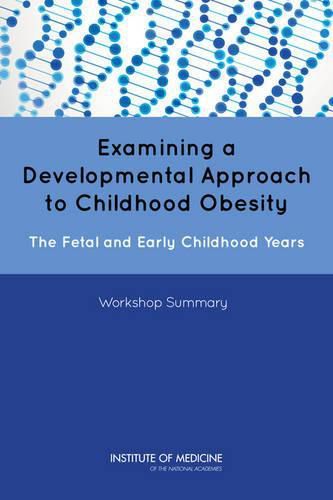Readings Newsletter
Become a Readings Member to make your shopping experience even easier.
Sign in or sign up for free!
You’re not far away from qualifying for FREE standard shipping within Australia
You’ve qualified for FREE standard shipping within Australia
The cart is loading…






Recent scientific evidence points to the origins of childhood obesity as an outcome of the dynamic interplay of genetic, behavioral, and environmental factors throughout early development, with a compelling body of evidence suggesting that both maternal and paternal nutritional and other exposures affect a child’s risk of later obesity. The burgeoning field of epigenetics has led researchers to speculate that many of the observed associations between early developmental exposures and later risk of childhood obesity are mediated, at least in part, through epigenetic mechanisms.
To explore the body of evolving science that examines the nexus of biology, environment, and developmental stage on risk of childhood obesity, the Institute of Medicine and the National Research Council convened a workshop in February 2015. The workshop focused on the prenatal period, infancy, and early childhood and addressed evidence from both animal and human studies. Workshop objectives were to (1) identify epigenetic-mediated relationships between exposure to risk factors during sensitive periods of development (gestation through age 3) and subsequent obesity-related outcomes; (2) explore the science around periods of plasticity and potential reversibility of obesity risk in the context of early childhood development; and (3) examine the translation of epigenetic science to guide early childhood obesity prevention and intervention to reduce obesity risk. This report summarizes the information presented and discussed at the workshop.
$9.00 standard shipping within Australia
FREE standard shipping within Australia for orders over $100.00
Express & International shipping calculated at checkout
Recent scientific evidence points to the origins of childhood obesity as an outcome of the dynamic interplay of genetic, behavioral, and environmental factors throughout early development, with a compelling body of evidence suggesting that both maternal and paternal nutritional and other exposures affect a child’s risk of later obesity. The burgeoning field of epigenetics has led researchers to speculate that many of the observed associations between early developmental exposures and later risk of childhood obesity are mediated, at least in part, through epigenetic mechanisms.
To explore the body of evolving science that examines the nexus of biology, environment, and developmental stage on risk of childhood obesity, the Institute of Medicine and the National Research Council convened a workshop in February 2015. The workshop focused on the prenatal period, infancy, and early childhood and addressed evidence from both animal and human studies. Workshop objectives were to (1) identify epigenetic-mediated relationships between exposure to risk factors during sensitive periods of development (gestation through age 3) and subsequent obesity-related outcomes; (2) explore the science around periods of plasticity and potential reversibility of obesity risk in the context of early childhood development; and (3) examine the translation of epigenetic science to guide early childhood obesity prevention and intervention to reduce obesity risk. This report summarizes the information presented and discussed at the workshop.